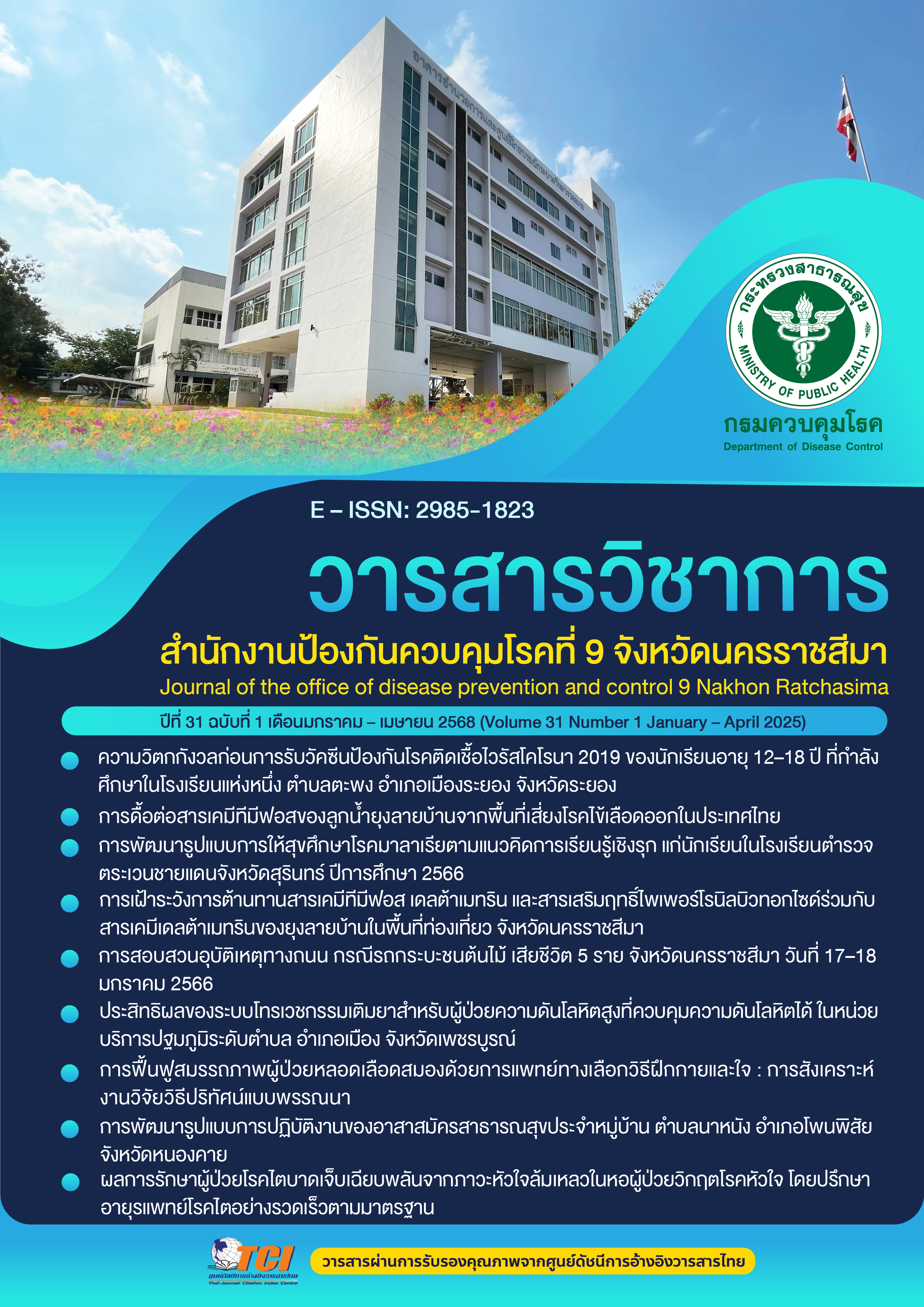Outcome of Patients: Early Nephrologist Consultation in Cardiorenal Syndrome
Keywords:
Acute Kidney Injury, Cardiorenal Syndrome, Cardiac Care Unit, Nephrologist Consultation, SepsisAbstract
The Cardiac Intensive Care Unit (CCU) at Maharat Nakhon Ratchasima Hospital has implemented a rapid nephrology consultation process for patients with acute kidney injury (AKI) secondary to heart failure. However, it remains unclear whether these measures have significantly impacted patient outcomes. The aims of this study were to investigate mortality rates, clinical characteristics, and factors associated with 28-day mortality among acute kidney injury (AKI) patients. This retrospective descriptive and analytical study used Cox regression analysis to evaluate the survival rate. Data were collected from the medical records of patients diagnosed with AKI in the CCU between November 2020 and August 2021. A total of 52 patients were included, with a mean age of 67.9+ 11.2 years. The majority were male patients (71.2%). At the time of nephrologist consultation, most patients (78.8%) were in stage 2 of kidney injury. The predominant cardiac diagnosis was ST-elevation myocardial infarction (STEMI)in 67.3% of cases. Treatment interventions included vasopressor medications (82.7%) coronary angiography (78.9%), and required an intra-aortic balloon pump (51.9%). The median cumulative fluid balance on day 5 was -1,119.0 mL (interquartile range: -2,859.5 to 1,616.0 mL). During hospitalization, the total follow-up period was 715 patient-days. with 27 deaths recorded, This Corresponds to an in-hospital mortality incidence of 9.4 per 100 patient-days (95%CI: 6.4-13.7). The median patient survival post-hospitalization was 19 days. Survival rates at 7, 14 and 28 days were 69.1% (95% CI: 0.546-0.426), 57.7% (95%CI: 0.426-0.702), and 39.4% (95%CI: 0.22-0.564), respectively. Significant factors associated with 28-day mortality included age ≥ 80 years (Adjusted Hazard Ratio: 4.66; 95%CI: 1.66-13.06; P=0.003) and sepsis (Adjusted Hazard Ratio 2.39;95%CI: 1.06-5.36; P=0.035). Therefore, AKI patients admitted to the CCU experience a high in-hospital mortality rate. Older age and sepsis are critical factors associated with 28-day mortality. These findings underscore the urgent need for targeted interventions to improve outcome in this high-risk patient population.
References
Chertow GM, Burdick E, Honour M, Bonventre JV, Bates DW. Acute Kidney Injury, Mortality, Length of Stay, and Costs in Hospitalized Patients. J Am Soc Nephrol 2005 Nov;16(11):3365–70.
Susantitaphong P, Cruz DN, Cerda J, Abulfaraj M, Alqahtani F, Koulouridis I, et al. World Incidence of AKI: A Meta-Analysis. Clin J Am Soc Nephrol 2013 Sep;8(9):1482–93.
Mehta RL, Cerdá J, Burdmann EA, Tonelli M, García-García G, Jha V, et al. International Society of Nephrology’s 0by25 initiative for acute kidney injury (zero preventable deaths by 2025): a human rights case for nephrology. The Lancet 2015 Jun 27;385(9987):2616–43.
Hoste EAJ, Kellum JA, Selby NM, Zarbock A, Palevsky PM, Bagshaw SM, et al. Global epidemiology and outcomes of acute kidney injury. Nat Rev Nephrol 2018 Oct;14(10):607–25.
Prothasis M, Varma A, Gaidhane S, Kumar S, Khatib N, Zahiruddin QS, et al. Prevalence, types, risk factors, and outcomes of cardiorenal syndrome in a rural population of central India: A cross-sectional study. J Fam Med Prim Care 2020 Aug 25;9(8):4127–33.
She CS, Deng YL, Huang GQ, Cheng C, Zhang FJ. Risk Factors and Outcome Variables of Cardiorenal Syndrome Type 1 in Acute Myocardial Infarction Patients. Int J Gen Med 2022 Feb 15;15:1565–73.
Rangaswami J, Bhalla V, Blair JEA, Chang TI, Costa S, Lentine KL, et al. Cardiorenal Syndrome: Classification, Pathophysiology, Diagnosis, and Treatment Strategies: A Scientific Statement From the American Heart Association. Circulation 2019 Apr 16;139(16):e840–78.
Ponce D, Zorzenon C de PF, dos Santos NY, Balbi AL. Early nephrology consultation can have an impact on outcome of acute kidney injury patients. Nephrol Dial Transplant 2011 Oct;26(10):3202–6.
Ronco C, Bellasi A, Di Lullo L. Cardiorenal Syndrome: An Overview. Adv Chronic Kidney Dis 2018 Sep;25(5):382–90.
Mehta RL, Kellum JA, Shah SV, Molitoris BA, Ronco C, Warnock DG, et al. Acute Kidney Injury Network: report of an initiative to improve outcomes in acute kidney injury. Crit Care 2007;11(2):R31.
Bock JS, Gottlieb SS. Cardiorenal syndrome: new perspectives. Circulation 2010 Jun 15;121(23):2592–600.
Ronco C, McCullough P, Anker SD, Anand I, Aspromonte N, Bagshaw SM, et al. Cardio-renal syndromes: report from the consensus conference of the acute dialysis quality initiative. Eur Heart J 2010 Mar;31(6):703–11.
Ronco C. Cardio-Renal Syndromes: Introduction. Semin Nephrol 2012 Jan;32(1):1–2.
Virzì GM, Clementi A, Brocca A, de Cal M, Vescovo G, Granata A, et al. The Hemodynamic and Nonhemodynamic Crosstalk in Cardiorenal Syndrome Type 1. Cardiorenal Med 2014 Aug;4(2):103–12.
Roy AK, Mc Gorrian C, Treacy C, Kavanaugh E, Brennan A, Mahon NG, et al. A Comparison of Traditional and Novel Definitions (RIFLE, AKIN, and KDIGO) of Acute Kidney Injury for the Prediction of Outcomes in Acute Decompensated Heart Failure. Cardiorenal Med 2013 Apr;3(1):26–37.
Rodríguez-Jiménez AE, Negrín-Valdés T, Cruz-Inerarity H, Machural-de La Torre PJ. Cardiorenal syndrome as predictor of in-hospital mortality in ST-segment elevation myocardial infarction. Clin Investig Arterioscler 2018 Jul-Aug;30(4):163–9.
Nilmoje T, Pongborriboon D, Boonsrirat U, Konwai S, Praditau-Krit S, Phongphithakchai A. Prognosis and factors affecting mortality in patients with acute kidney injury due to cardiorenal syndrome type 1 treated with sustained low-efficiency dialysis. J Nephropharmacology 2024 Jun 24;13(2):e12686.
Seckinger D, Ritter O, Patschan D. Risk factors and outcome variables of cardiorenal syndrome type 1 from the nephrologist’s perspective. Int Urol Nephrol 2022;54(7):1591–601.
Watanabe Y, Inoue T, Nakano S, Okada H. Prognosis of Patients with Acute Kidney Injury due to Type 1 Cardiorenal Syndrome Receiving Continuous Renal Replacement Therapy. Cardiorenal Med 2023;13(1):158–66.

Downloads
Published
How to Cite
Issue
Section
License
Copyright (c) 2025 The office of disease prevention and control 9th Nakhon Ratchasima

This work is licensed under a Creative Commons Attribution-NonCommercial-NoDerivatives 4.0 International License.
บทความที่ลงพิมพ์ในวารสารวิชาการสำนักงานป้องกันควบคุมโรคที่ 9 จังหวัดนครราชสีมา ถือว่าเป็นลิขสิทธิ์ สำนักงานป้องกันควบคุมโรคที่ 9 จังหวัดนครราชสีมา



